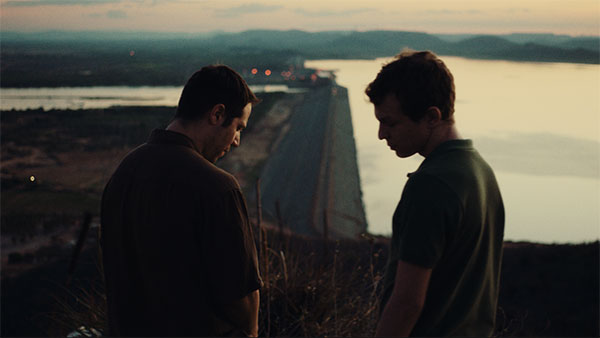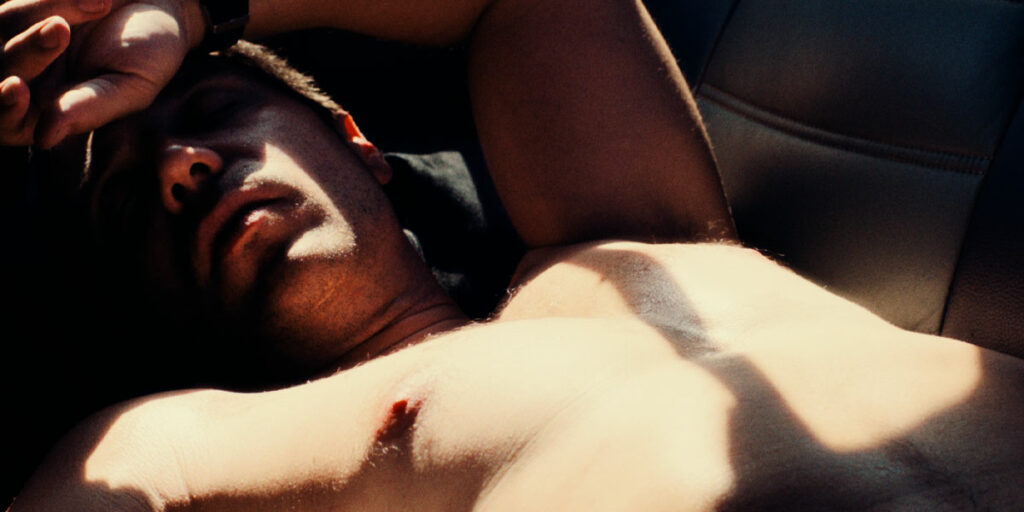Aly Muritiba’s Private Desert is not just an intimate, erotic story of queer love; it’s a timely, urgent film of incredible importance to both Brazilian and international societies.
Private Desert (Deserto Particular) doesn’t drop its title card or opening credits until 30 minutes in, an ever more frequent choice that modern films are making. Just like in 2021’s Drive My Car, where the title displays after an extended prologue and as the infamous red Saab is finally driven, Private Desert spends its opening half an hour with one of its main characters, Daniel, only dropping the title when he leaves the city of Curitiba for the small town of Sobradinho. This patient tactic works wonders for the character, eventual setting and the main story. Director and co-writer Aly Muritiba continually infuses Private Desert with this reserved but potent emotional angle, resulting in an exquisite and remarkably sensual journey of self-discovery and freedom.
Daniel (Antonio Saboia, Bacurau) is a tightly wound man with a severe masculine edge, which has been built by the influence of his family’s police and military background. There are signs of tenderness – he cares dutifully for his father, who is ailing both physically and mentally in old age – but his bulky, balled-up frame and recent suspension from duty for a violent incident highlight a very clear machismo rage. After his internet girlfriend Sara (Pedro Fasanaro) stops replying to him, he drives to Sobradinho to meet in person. At first unfurling like a mystery, Daniel’s search for Sara morphs into a beautiful journey of self-acceptance; unbeknownst to Daniel, Sara is in fact a genderfluid person who also lives as their male birth identity Robson. Early homophobia from Daniel towards his sister is undercut with the possibility of this stemming from his own sexuality issues. Throughout both Daniel and Robson / Sara’s intertwining journey, Muritiba and co-writer Henrique dos Santos treat their characters with real compassion, bolstering their relationships and the themes of Private Desert with a detailed and complex screenplay.
The impressive script is further enhanced by Luis Armando Ateaga’s (Tremors) cinematography, which captures the lush world of Sobradinho and enriches the most intimate moments of Private Desert. Daniel is consistently captured on his own in earlier scenes, shrouded either by cold walls or an empty city at night; as he moves towards Sobradinho, his surroundings become more expansive. Whilst his journey is rightfully never simplified and bigotry still resides openly in Sobradinho, despite there being an expressive LGBTQIA+ community, the screen becomes more colourful, more open when he leaves Curitiba, imbuing Private Desert with a tangible hopefulness. Lips seductively dancing with one another closely before falling into a passionate kiss are captured in silhouettes only, heightening the intense sensuality simmering within and between the characters.

At a time when LGBTQIA+ rights are either in jeopardy or non-existent, both around the world and in Brazil, Private Desert is as timely as any film can be. Its messages of acceptance and for people to have the freedom to be who they are obvious but crucial to highlight in the face of discrimination. Muritiba and dos Santos’ screenplay impressively brings this bigotry to the fore whilst still finding cause for celebration in its gorgeous central romance. Daniel’s face lights up when he sees Sara – and eventually Robson too – with an unabashed smile stretching across his face, with these moments of happiness given special importance when contrasted with his usual gruff persona.
Saboia brings a complexity to Daniel, physically and mentally transforming from a tightly wound man into someone who can sense real self-liberty, whilst Fasanaro expertly moves between the freedom of their character’s gender fluidity and their increasing depression at the constant discrimination they face. Daniel is given slightly more characterisation than Robson / Sara, with their backstory slightly lacking in detail, but the two actors brilliantly paint a relationship that is built on love but informed by societal bigotry, with their sexual interactions boasting an indelible lustfulness.
With its haunting but beautiful original score by Felipe Ayres and vivid, thoughtful lighting, Private Desert is a swooning cinematic odyssey of love, one which shines a thoughtful spotlight on the queer community in Brazil. Its pared back style occasionally loosens its narrative thrust, but Private Desert remains structurally sound. It sings with a crystal-clear voice of humanity, simultaneously calling for serious change and finding cause for celebration. Love, whatever form, and humans, whatever form, are beautiful entities, no two the same; Private Desert sees this complexity and artfully lays it out, with its central passion becoming less and less obscured as the film progresses.
Private Desert is now available to watch on digital and on demand.

